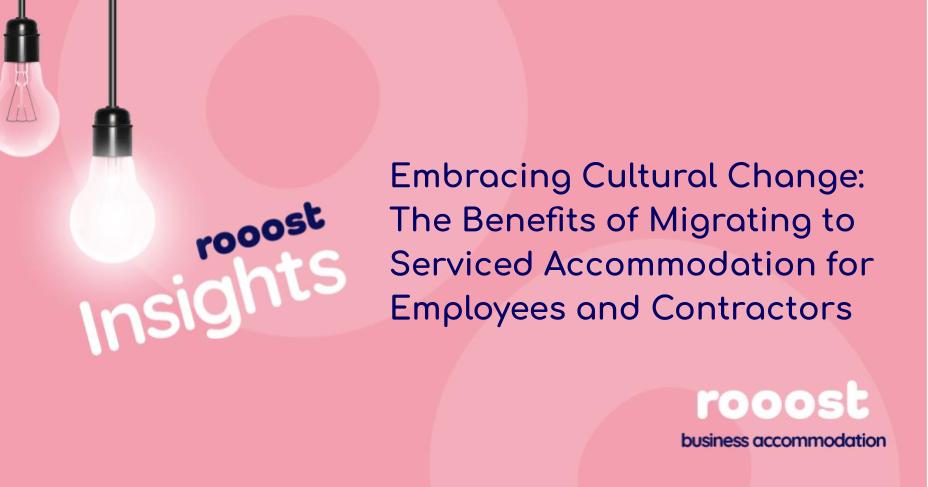Embracing Cultural Change: The Benefits of Migrating to Serviced Accommodation for Employees and Contractors

In the ever-evolving landscape of corporate culture, organisations are constantly seeking ways to enhance the well-being, productivity, and satisfaction of their employees and contractors. One significant shift that has garnered attention in recent years is the transition from traditional hotel stays to serviced accommodation. This cultural change brings about numerous benefits, transforming the way organisations provide accommodation for their workforce. In this article, we will explore the advantages of this shift and its impact on organisational culture.
1. Personalized Comfort and Flexibility
Serviced accommodation offers employees and contractors a more homely and comfortable environment compared to hotels. It allows them to customise their living spaces, making them feel more at ease. This level of personalization fosters a sense of belonging, creating a positive cultural shift within the organisation. Employees and contractors feel valued, knowing that their well-being is a top priority. This personal touch contributes to a more relaxed and productive atmosphere.
2. Cost-Efficiency and Sustainability
Switching to serviced accommodation often results in significant cost savings for organisations. In comparison to hotel stays, serviced apartments or other types of serviced accommodation can be more cost-effective, especially for long-term assignments. These cost savings can be allocated to other areas, such as professional development or employee benefits. Additionally, the reduced environmental impact of serviced accommodation aligns with sustainability goals, reflecting positively on the company's culture.
3. Enhanced Work-Life Balance
One of the significant cultural changes that come with this transition is a stronger emphasis on work-life balance. The more home-like environment of serviced accommodation helps employees and contractors separate work from personal life more effectively. This shift promotes well-being, reduces stress, and contributes to a healthier work culture. Employees and contractors are more likely to recharge, ultimately leading to improved job satisfaction and performance.
4. Increased Productivity
Serviced accommodation often provides more spacious and functional living spaces, including fully-equipped kitchens and dedicated workspaces. These features empower employees and contractors to maintain their productivity while travelling. A cultural shift toward valuing and supporting their work needs can lead to improved efficiency and morale. When employees and contractors feel that their organisation invests in their success, they are more likely to reciprocate with greater commitment.
5. Community Building
Serviced accommodation facilities often encourage community-building among residents. Shared spaces like lounges, gyms, and dining areas facilitate interaction among employees and contractors from various backgrounds. This cultural change promotes a sense of belonging and camaraderie, creating a more inclusive and diverse work environment. The opportunity to connect with colleagues fosters a supportive and engaging culture within the organisation.
6. Local Immersion and Employee Satisfaction
Serviced accommodation often places employees and contractors in residential neighbourhoods, allowing them to immerse themselves in the local culture. This not only enriches their travel experience but also contributes to a deeper connection with the organisation's global presence. Employees and contractors appreciate the opportunity to explore new cultures, try local cuisines, and engage with local communities. This cultural change promotes a more cosmopolitan and worldly perspective within the organisation.
7. Retention and Attraction of Talent
An organisation's commitment to providing serviced accommodation as part of its cultural shift can significantly enhance its attractiveness to both existing and potential employees and contractors. The improved living conditions, work-life balance, and personalised experience contribute to high retention rates and make it easier to attract top talent. A culture that prioritises the well-being and comfort of its workforce becomes a beacon for those seeking a fulfilling career.
In conclusion, the migration from hotels to serviced accommodation represents a profound cultural shift within organisations. This change brings about a range of benefits, from enhanced comfort and flexibility to cost-efficiency, improved work-life balance, and increased productivity. It also fosters a sense of community, supports local immersion, and contributes to talent retention and attraction. Ultimately, organisations that embrace this cultural change demonstrate their commitment to the well-being and satisfaction of their employees and contractors, fostering a positive and inclusive corporate culture.

 share
share